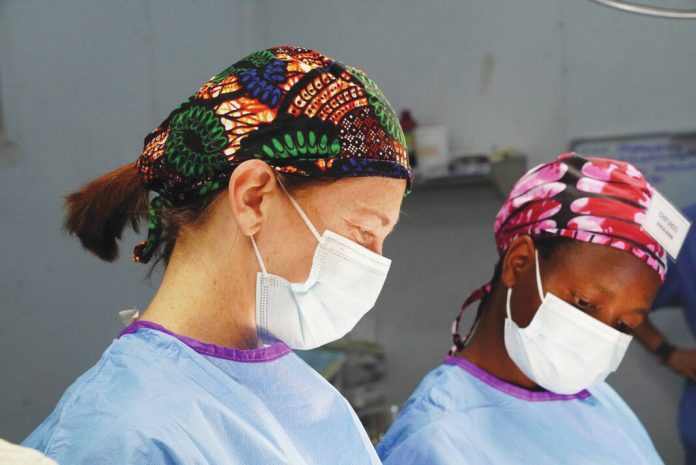Less than 10 years ago, Ashley Malloy was often supporting athletes, tending them on the sidelines as an athletic trainer, or coaching young softball players on the New Palestine High School junior varsity softball team.
For the past six years, though, her place has been not on the sideline of a court or field, but on the side of a hill — overlooking a valley in central Malawi, a country in southeast Africa. She’s part of a different type of team, one whose goal is to meet the growing healthcare needs of about 35,000 people in the surrounding area.
Malloy is a nurse practitioner, working with doctors and nurses at Blessings Hospital near Malawi’s capital, a city of about one million. She’s also part of an 11-member leadership team that oversees the hospital and its mobile clinics, which expand the availability of medical care into nearby villages.
The New Palestine High School graduate originally became an athletic trainer, graduating from Franklin College and Troy University. After finishing graduate school at Troy, she remained in Alabama as a trainer for the Faulkner University football team.
But during those years, she also went on some short-term trips, including her first trips to Malawi. She enjoyed her althletic training work but began to wonder if she could be more useful globally with added training. She began to study nursing, eventually becoming a nurse practitioner. In early 2017, she boarded a one-way flight to Malawi.
During a visit to Indiana over Christmas, she took time to talk about the ongoing work at Blessings, which had seen nearly 12,000 patients from January through November of 2023.
“They’ve really grown and exploded over the last couple of years,” Malloy said. “… Our maternity service is probably the busiest right now.”
Over the past several years, one mobile medical clinic has become several. A Blessings doctor has been accepted into a general surgery residency, and hospital leaders hope when he completes the program in five years, he’ll return to the hospital and expand the services it’s able to offer. The number of beds in the maternity ward has doubled, and paperwork is in process for the hospital to receive reimbursement from Malawi’s government and offer maternity and neonatal services to patients without fee.
“We are very excited about the way this will open doors to people in our community who are currently unable to access care at our facility,” she said, but with that comes needs for more staff and for keeping financing stable until government reimbursements, often 1-2 months retroactive, arrive.
There are other ebbs and flows in a year at a hospital, such as seasons where malaria is more prevalent, or outbreaks such as an uptick in cholera cases in the early months of 2023.
Malloy said the hospital team did a good job responding to that outbreak, and as the hospital staff gains more years of experience and success in treating those types of cases, there’s a shift taking place. Now there are more chronic illness cases to treat, such as high blood pressure, diabetes or strokes.
Without a full-time surgeon yet, the hospital welcomes surgical teams from the United States two to three times a year. Repairing hernias, performing biopsies and clearing bowel obstruction are some of the types of surgical work patients need. Malloy helps make arrangements for those teams to visit.
Michele Willis saw those visits unfold in person. In May, Willis became director of Chikondi Health Foundation, a non-profit with headquarters in Alabama that seeks to support the work at Blessings. (Chikondi means “love” in the language spoken by many in Malawi.)
“Ashley is a wonderful nurse practitioner,” Willis wrote in an email, “and she also is a great liaison as we plan our surgical trips several times a year where we take surgeons and medical staff from the U.S. to work alongside our Malawi staff to provide life changing surgeries that some people have waited for years to have.
“… We also have a full malaria program with testing and treatment that didn’t exist 6 years ago either. This was a direct vision of Ashley’s after seeing a young child die of malaria and knowing that it was preventable.”
Along with staff and programming pieces of the hospital’s work, there are equipment needs to consider. During 2023, the hospital obtained X-ray and ultrasound machines with help from the Rotary Club in Greenwood. Now Malloy hopes the hospital can buy more oxygen monitors for patients in critical condition, establish a room that can be kept very warm to protect premature babies, and meet other needs.
Malloy’s workday often begins around 7 a.m., perhaps by making rounds to patients with a physician. She often leaves the hospital at 5:30 or 6 p.m., has dinner and some downtime — in the house she shares with a roommate, a fellow American woman who teaches nearby — and does it all again the next weekday. Weekends typically include church, groceries, eating out and perhaps time with friends.
It’s a pretty simple life, she says, but it suits her.
“My morning coffee spot may be one of my favorite places on the planet to just sit and be,” Malloy said. “We are perched at the highest point in our surrounding area, and our porch looks out over a small valley with a small group of mountains opposite of us, facing the east which provides beautiful sunrises each morning. …
“My favorite part of the day is listening and watching the world wake up from that spot while enjoying a cup of coffee and a little one-on-one time with God.”
LEARN MORE
Find out more about the work at Blessings Hospital, and ways to support that work, at chikondihealth.org.





